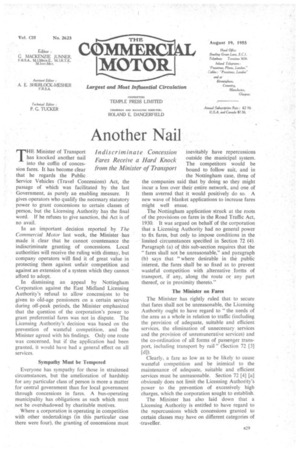Another Nail
Page 68

If you've noticed an error in this article please click here to report it so we can fix it.
THE Minister of Transport has knocked another •hail into the coffin of concession fares. It has become clear that he regards the Public , Service Vehicles (Travel Concessions) Act, the passage of which was facilitated by the last Government, as purely an enabling measure. It gives operators who qualify the necessary statutory power to grant concessions to certain classes of person, but the Licensing Authority has the final word. If he refuses to give sanction, th Act is of no avail.
In an important decision reported by The Commercial Motor last week, the Minister has made it clear that he cannot countenance the indiscriminate granting of concessions. Local authorities will receive the ruling with dismay, but company operators will find it of great value in protecting them against unfair competition and against an extension of a system which they cannot afford to adopt.
In dismissing an appeal by Nottingham Corporation against the East Midland Licensing Authority's refusal to allow concessions to be given to old-age pensioners on a certain service during off-peak periods, the Minister emphasized that the question of the corporation's power to grant preferential fares was not in dispute. The Licensing Authority's decision was based on the prevention of wasteful competition, and the Minister agreed with his findings. Only one route was concerned, but if the application had been granted, it would have had a general effect on all services.
Sympathy Must be Tempered Everyone has sympathy for those in straitened circumstances, but the amelioration of hardship for any particular class of person is more a matter for central government than for local government through concessions in fares. A bus-operating municipality has obligations as such which must not be overshadowed by charitable motives.
Where a corporation is operating in competition with other undertakings (in this particular case there were four), the granting of concessions must Indiscriminate Concession inevitably have repercussions Fares Receive a Hard Knock outside the municipal system. The competitors would be from the Minister of Transport bound to follow suit, and in the Nottingham case, three of the companies said that by doing so they might incur a loss over their entire network, and one of them averred that it would positively do so. A new wave of blanket applications to increase fares might well ensue.
The Nottingham application struck at the roots of the provisions on fares in the Road Traffic Act, 1930. It was argued on behalf of the corporation that a Licensing Authority had no general power to fix fares, but only to impose conditions in the limited circumstances specified in Section 72 (4). Paragraph (a) of this sub-section requires that the "fares shall not be unreasonable," and paragraph (b) says that "where desirable in the public interest, the fares shall be so fixed as to prevent wasteful cornpetition with alternative _forms of transport, if any, along the route or any part thereof, or in proximity thereto."
The Minister on Fares The Minister has rightly ruled that to secure that fares shall not be unreasonable, the Licensing Authority ought to have regard to "the needs of the area as a whole in relation to traffic (including the provision of adequate, suitable and efficient services, the elimination of unnecessary services and the provision of unremunerative services) and the co-ordination of all forms of passenger transport, including transport by rail" (Section 72 [3] [d]).
Clearly, a fare so low as to be likely to cause wasteful competition and be inimical to the maintenance of adequate, suitable and efficient services must be unreasonable. Section 72 [4] [a] obviously does not limit the Licensing Authority's power to the prevention of excessively high charges, which the corporation sought to establish.
The Minister has also laid down that a Licensing Authority is entitled to have regard to the repercussions which concessions granted to certain classes may.have on different categories of .traveller.








































































































